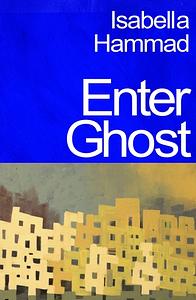Take a photo of a barcode or cover
I will read any author featured on the Tin House podcast, Between the Covers, and really enjoyed hearing Isabella Hammad in conversation with David Naimon, which led me to Enter Ghost.
I loved this book, charting 38-year-old Sonia’s return to Palestine and her participation in a West Bank production of Hamlet. Hamlet is my second-favorite Shakespeare play and provides such rich material for diving into the inner worlds of the actors in the novel. I was reminded of a favorite This American Life episode from 2002, Act Five, which follows a production of Hamlet within the carceral system. Hamlet takes on new meaning depending on the context in which it’s staged, where the play is taking place, and who is acting within it.
On a formal level, the play-within-the-novel sections were clever and helped break up the dense narrative. Hammad writes about the ongoing realities of occupation in a seamless way, weaving violence and unease into descriptions of daily life or play rehearsals. Despite being political and musing on the role of art/theater in exposing oppression and injustice, the novel is deeply psychological. The balancing of quotidian details (Sonia’s tense relationship with her sister, the nuances of Palestinian diasporic identity, the aftermath of her marriage and a subsequent affair) with philosophical questions of activism and resistance reminded me of Intimacies by Katie Kitamura, which also blends personal and political in a restrained and illuminating way.
Podcasts mentioned:
https://tinhouse.com/podcast/isabella-hammad-enter-ghost/
https://www.thisamericanlife.org/218/act-v
I loved this book, charting 38-year-old Sonia’s return to Palestine and her participation in a West Bank production of Hamlet. Hamlet is my second-favorite Shakespeare play and provides such rich material for diving into the inner worlds of the actors in the novel. I was reminded of a favorite This American Life episode from 2002, Act Five, which follows a production of Hamlet within the carceral system. Hamlet takes on new meaning depending on the context in which it’s staged, where the play is taking place, and who is acting within it.
On a formal level, the play-within-the-novel sections were clever and helped break up the dense narrative. Hammad writes about the ongoing realities of occupation in a seamless way, weaving violence and unease into descriptions of daily life or play rehearsals. Despite being political and musing on the role of art/theater in exposing oppression and injustice, the novel is deeply psychological. The balancing of quotidian details (Sonia’s tense relationship with her sister, the nuances of Palestinian diasporic identity, the aftermath of her marriage and a subsequent affair) with philosophical questions of activism and resistance reminded me of Intimacies by Katie Kitamura, which also blends personal and political in a restrained and illuminating way.
Podcasts mentioned:
https://tinhouse.com/podcast/isabella-hammad-enter-ghost/
https://www.thisamericanlife.org/218/act-v
challenging
hopeful
reflective
medium-paced
Plot or Character Driven:
A mix
Strong character development:
Yes
Loveable characters:
Yes
Diverse cast of characters:
Yes
Flaws of characters a main focus:
Yes
It was good but a bit slow, I will come back to it when I have the right focus and mindset.
What a layered and complicated story is Palestine and Gaza and Israel and the Middle East. Hammad does a wonderful job of lifting the layers while telling the tale of the exile come home, Sonia. But what is home to the one seeking refuge? The West Bank? Haifa? Ramallah? England? There are many ghosts here, many torn apart, lost places. They will all haunt me for days and weeks to come.
Wow. What a gorgeous story of life and art in Palestine. This rocked me.
emotional
hopeful
informative
inspiring
reflective
medium-paced
emotional
reflective
medium-paced
Felt like reading a new genre, and saying any more than that would be trite. Well done Ms Hammad.
had a hard time following between the past and present storylines






